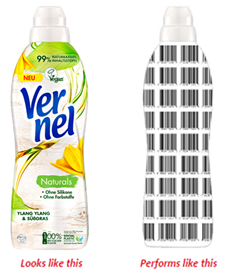Pioneering digital watermarks for better packaging recycling: Henkel is one of more than 85 companies and organizations of the new cross-value chain initiative “HolyGrail 2.0”, launched by AIM, the European Brands Association. The goal of the initiative is to assess whether a pioneering digital technology can enable better sorting and higher-quality recycling rates for packaging in the EU, to drive a truly circular economy. As a pilot project, Henkel will explore this innovative digital watermark technology for a new product range of its fabric softener brand Vernel.
One of the most pressing challenges in achieving a circular economy for packaging is to better sort post-consumer waste by accurately identifying packaging, resulting in more efficient and higher-quality recycling. Digital watermarks perform like a barcode invisible to the human eye on the packaging. They may have the potential to revolutionise the way packaging is sorted in the waste management system, as it opens new possibilities that are currently not feasible with existing technologies. Based on the initial HolyGrail project under the Ellen MacArthur Foundation, the “HolyGrail 2.0” initiative will take place on a much greater scale and scope. This will include the launch of an industrial pilot in order to prove the viability of digital watermarks technologies for more accurate sorting of packaging and higher-quality recycling, as well as the business case at large scale.
“We at Henkel are constantly exploring new possibilities to enhance the recyclability and sustainability features of our product packaging. In addition, we promote projects and initatives that aim to drive innovation in packaging development and accelerate the transition to a circular economy,” says Dr. Thorsten Leopold, Head of International Packaging Development Home Care at Henkel. “We are proud to be among the pioneers for the new digital watermark technology, bringing the concept of the HolyGrail 2.0 project to life and breaking ground to overcome recycling challenges.”
Henkel among the pioneers with first specific project
Henkel is leading by example and is implementing the new technology in two Vernel products, which will be launched in October in Germany.
“Our Vernel bottles are made from 100 percent recycled and recyclable PET and are surrounded by a removable sleeve made of a different material. When it comes to the recycling of this packaging, we currently still rely on the consumer to separate the two types of plastic materials as many sorting lines are not able to identify the bottle material correctly”, elaborates Dr. Thorsten Leopold. “Digital watermarking presents a possibility to elude this step. The bottle material could be easily detected and efficiently sorted in the correct material fraction. With the pilot project for the latest Vernel range, we want to gain further insights for the implementation and development of the digital watermark technology and assess possible benefits for the recycling of packaging.”
Digital watermarks – imperceptible yet impactful
Digital watermarks are imperceptible codes, the size of a postage stamp, covering the surface of a consumer goods packaging. They can carry a wide range of attributes such as manufacturer, SKU, type of plastics used and composition for multilayer objects, food vs. non-food usage, etc. The aim is that once the packaging has entered into a waste sorting facility, the digital watermark can be detected and decoded by a standard high resolution camera on the sorting line, which then – based on the transferred attributes – is able to sort the packaging in corresponding streams. This would result in better and more accurate sorting streams, thus consequently in higher-quality recyclates benefiting the complete packaging value chain. Next to this “digital recycling passport”, digital watermarks also have the potential to be used in other areas such as consumer engagement, supply chain visibility and retail operations.
Collaboration along the value chain to promote a circular economy
After already being part of the first HolyGrail project, the active participation in HolyGrail 2.0 is yet another example of Henkel’s commitment to drive innovation in sustainable packaging development and foster a circular economy. The company is engaged in many cross-industry initiatives and partnerships: for example, Henkel is a founding member of the Alliance to End Plastic Waste (AEPW) and partners with the social enterprise Plastic Bank.
Earlier this year, Henkel released a new set of ambitious packaging targets for 2025. They include: Making 100 percent of Henkel’s consumer goods packaging recyclable or reusable*, reducing the amount of virgin plastics from fossil sources in consumer product packaging by 50 percent and helping to prevent plastic waste from being disposed of in the environment.
More information on Henkel’s commitment and actions for sustainable packaging can be found at www.henkel.com/plastic.
* Excluding adhesive products where residue may affect recyclability or pollute recycling streams
Source : Henkel Newsroom
Packaging 360 is a comprehensive knowledge sharing ecosystem for the Indian packaging industry. Our services include an online content platform to deliver news, insights and case studies; organising conferences seminars and customised training; Providing Bespoke Project Consulting, Market Research and Intelligence.







